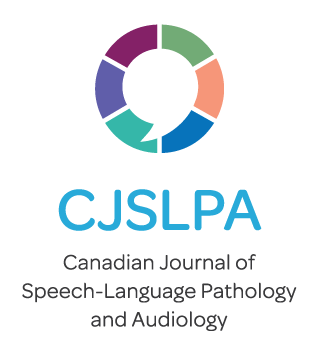

| Author(s) |
Patricia Côté-Giroux Natacha Trudeau Christine Valiquette Ann Sutton Elsa Chan Catherine Hébert |
| Volume | 35 |
| Number | 4 |
| Year | 2011 |
| Page(s) | 300-311 |
| Language | French |
| Category | |
| Keywords |
TROUBLE SÉVÈRE DU LANGAGE SUPPLÉANCE À LA COMMUNICATION ORALE SYNTHÈSES HUMAINE ÂGE |
| Abstract |
Introduction : Grâce à l’avancement de la technologie dans le domaine de la communication humaine, plusieurs synthèses de voix françaises ont vu le jour. Celles-ci sont de plus en plus recommandées par les spécialistes pour les personnes atteintes de troubles de la communication. L’objectif de ce projet est d’identifier les synthèses de voix francophones les plus intelligibles selon la condition de production (mots, phrases) et d’évaluer l’appréciation de ces différentes voix. Méthode : Soixante et un participants répartis en trois groupes d’âge (14-20 ans, n = 20; 21-40 ans, n = 20; 41-60 ans, n = 21) ont été recrutés. La tâche consistait 1) à identifier des mots (isolés et contenus dans des énoncés) produits par neuf synthèses vocales et par une voix humaine dans deux conditions (mots isolés et mots en contexte) et 2) à donner leur appréciation globale pour chaque synthèse vocale. Résultats : Les résultats des analyses statistiques démontrent qu’il n’y a pas d’effet de genre ou d’âge sur l’intelligibilité et l’appréciation des synthèses vocales. La performance est plus élevée pour les mots en contexte (90%) comparativement aux mots isolés (71%). De plus, les résultats révèlent que deux synthèses vocales en condition de mots isolés (> 84%) et cinq en condition de mots en contexte (> 92%) sont aussi intelligibles que la voix humaine. Une différence significative a été trouvée entre les niveaux d’appréciation attribués aux synthèses vocales. Il existe également une corrélation positive entre l’intelligibilité des productions de mots et l’appréciation subjective de ces productions. Conclusion : Cette étude met en évidence une hiérarchie de l’intelligibilité et du niveau d’appréciation des différentes synthèses vocales francophones permettant aux professionnels d’obtenir des balises objectives pouvant les guider lors de l’attribution de systèmes et logiciels de communication relatifs à chaque client. Introduction: Technological advancements in human communication have led to the development of several French synthesized voices, which specialists are recommending more and more often to people with communication disorders. This study aimed to determine which French synthesized voice was the most intelligible in various productions (words, sentences), and to assess people’s ratings of these voices. Method: We recruited sixty-one participants and split them into three age groups (14-20 years, n = 20; 21-40 years, n = 20; 41-60 years, n = 21). The task consisted of 1) identifying words (in isolation and utterances) produced by nine synthesized voices, as well as words produced by one human voice (in isolation and in context); and 2) giving an overall rating to each synthesized voice. Results: Statistical analysis shows no effect of sex or age on intelligibility or voice rating. The best performance was noted with words in context (90%) as compared to isolated words (71%). In addition, results indicate that two synthesized voices producing words in isolation (> 84%) and five synthesized voices producing words in context (> 92%) were equally as intelligible as the human voice. We noted a significant difference between the rating levels given to the synthesized voices. There was also a positive correlation between the intelligibility of the produced words and the subjective ratings given to these productions. Conclusion: This study outlines a hierarchy in the intelligibility and rating levels of various French synthesized voices, which will give professionals objective benchmarks to guide decision-making when they recommend communication systems and software to their clients. |
| Record ID | 1082 |
| Link | https://cjslpa.ca/files/2011_CJSLPA_Vol_35/No_04_277-371/Cote-Giroux_Trudeau_Valiquette_Sutton_Chan_Hebert_CJSLPA_2011.pdf |
CJSLPA is an open access journal which means that all articles are available on the Internet to all users immediately upon publication. Users are allowed to read, download, copy, distribute, print, search, or link to the full texts of the articles, or use them for any other lawful purpose.
CJSLPA does not charge authors publication or processing fees.
Copyright of the Canadian Journal of Speech-Language Pathology and Audiology is held by Speech-Language and Audiology Canada (SAC). Appropriate credit must be given (SAC, publication name, article title, volume number, issue number and page number[s]) but not in any way that suggests SAC endorses you or your use of the work. You may not use this work for commercial purposes. You may not alter, transform, or build upon this work.